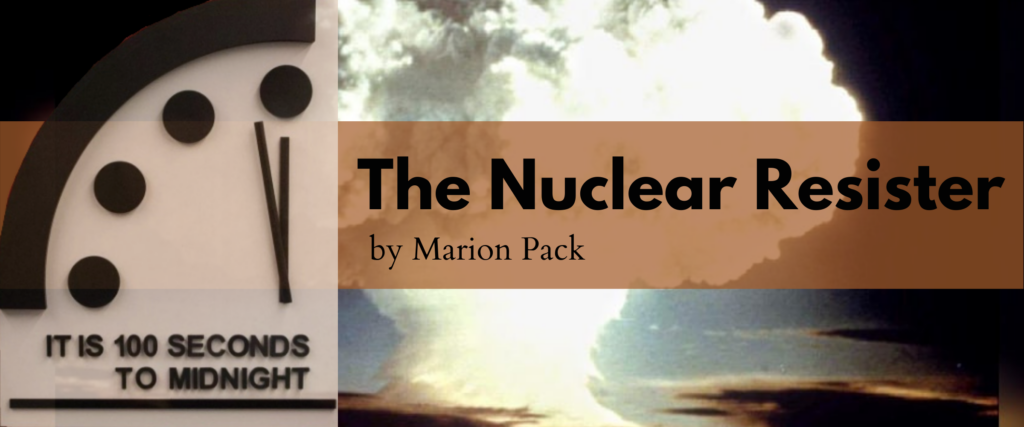
The Nuclear Resister #5 by Marion Pack
The U.S Nuclear Weapons Triad – Should the U.S. build a new generation of long-range
intercontinental ballistic missiles?
The U.S. depends on a triad of nuclear weapons for national security: sea-launched, landlaunched, and long-range strategic bombers. This article of The Nuclear Resister examines the
land-launched leg of that triad: land-based intercontinental ballistic missiles. Should we replace
these weapons with a costly new round of weapons? Should we extend the life of our existing
weapons system? Should an extension of time be used to determine if this leg of the triad is
needed?
Currently, the U.S. has 400 Minuteman III missiles in underground, reinforced concrete silos.
We also have fifty additional empty silos which we use as decoys. The Minutemen were first
deployed in the 1970’s and now reside near air force bases in Montana, North Dakota, and
Wyoming. These states benefit from the resultant infrastructure dollars invested in them, and
each of the three bases supports about 1,000 people. It’s not surprising therefore that the core
supporters of the missiles and their bases are the six senators from these three sparsely populated
states.
Under the Obama administration, the Department of Defense lobbied for a program to replace
the Minuteman III missiles with an equal number of new missiles, plus spares and test missiles,
for a total of 642 new weapons. The Air Force estimates the total cost will run over $100 billion.
In 2020, the Air Force awarded Northrup Grumman $13.3 billion for a new weapons system
design. Northrup Grumman then divided the work between numerous subcontractors, including
Aerojet Rocketdyne, Bechtel, Lockheed Martin, General Dynamics, and many medium and
smaller companies. The companies are scattered across numerous states. Spreading the work
around is a purposeful plan. When so many companies and so many jobs are involved, it
becomes much more difficult to cancel a contract—because each company has a vested interest
in keeping the money flowing.
This strong coalition successfully lobbied to block a proposal for a new study that would have
examined whether the life of the existing Minuteman III missiles should be extended, an
extension already done once in the early 2000s. An extension might not be great, but it would
cost drastically less than the cost of the production and deployment of a whole new missile
system.
Besides cost, there are other arguments as to why we don’t need to replace these missiles. One is
their vulnerability. Ground-based nuclear missiles, unlike missiles deployed on submarines, are
an easy target. Missiles deployed on submarines can be anywhere! Once submerged, submarines
can’t be targeted, so they are almost invulnerable. During the cold war the U.S. Navy made a
huge investment of money to quiet its submarines. Case in point: in 1993 a U.S. submarine was
tracking a Russian ballistic-missile submarine. The Russian sub had no idea that our sub was
tracking it; so when it turned, the two collided! U.S. submarines carry over half of our deployed
nuclear forces and are the most survivable leg of the triad.
Strategic bombers are vulnerable too, but not as much as silo-based weapons because they are
not subject to “launch-on-warning.” And unlike intercontinental ballistic missiles, they can be
recalled!
The removal of ground-based nukes from the triad would effectively end our dangerous launchon-warning policy. With mere minutes to launch missiles before they are destroyed in their silos,
this policy becomes one of “use them or lose them” with its high risk of accidental launches and
uncontrollable outcomes.
For far too long the policy of launch-on-warning has kept the world in a state of fear of
accidental nuclear war. We have a new opportunity with the Biden administration. We must raise
our voices and push President Biden to lead the way to a safer world—free of the nuclear threat.
One tiny virus has brought down the economy of the entire world. One would think that after
over a year of fighting COVID our leaders and our citizens would realize that spending billions
on nuclear weapons does not make us safe!
Contact: President Joseph Biden
The White House
1600 Pennsylvania Ave.
Washington, DC 20500
Website: whitehouse.gov/contact
Comments: 202-456-1111
